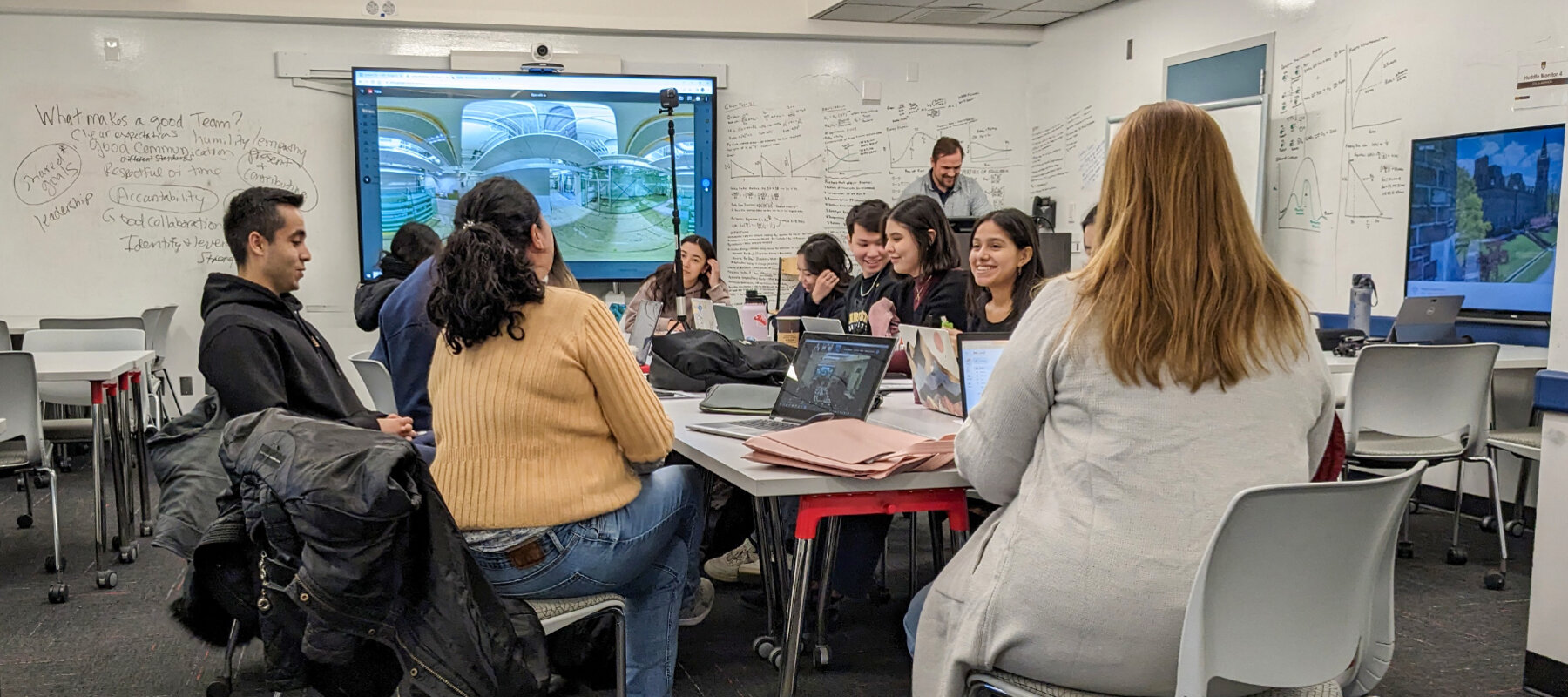In August 2022, the Office of International Affairs (OIA) and the LTS Center for Innovation in Teaching and Learning (CITL) partnered to form the Virtual International Exchange (VIE) Community of Practice to develop and support innovations in teaching.
The community of practice includes staff from CITL, the International Center for Academic and Professional English (ICAPE) and Global Partnerships and Strategic Initiatives. It offers teaching workshops, information sessions, and mentoring for faculty and staff who want to use technology to facilitate virtual international collaborations.
A partnership built on a shared desire to innovate
The partnership between CITL and OIA developed from a shared interest in Collaborative Online International Learning, or COIL, a pedagogical approach to global learning in which instructors in different countries collaborate virtually to develop and teach a joint thematic unit. While COIL is one specific approach, the term Virtual International Exchange (VIE) is more broadly defined. It can include one-off collaborations or short-term projects with an international partner as well as long-term, multi-project initiatives.
“CITL always looks to build partnerships across the university to foster innovative teaching and learning environments,” says Peggy Kane, the center’s director and a member of the community of practice. “This collaboration with OIA on the Virtual International Exchange Community of Practice is a very natural collaboration that lets each organization contribute to instructors creating impactful global learning experiences for our students.”
ICAPE staff first tried a COIL collaboration in 2020, pairing a class with an English club at a university in Kazakhstan. “It started with us because we already had experience in using virtual methods in creative and innovative ways to meet global learning objectives,” says Mark Ouellette, the director of ICAPE.
In spring 2022, Teresa Cusumano, a language specialist in ICAPE, launched another COIL exchange, pairing ENGL 5 with a first-year composition course at Universidad San Francisco de Quito (USFQ) in Quito, Ecuador. The course included synchronous and asynchronous learning, virtual guest speakers and a virtual tour of the Lehigh University Art Galleries.
Cusumano says COIL can help both students and faculty increase their cultural awareness and competence. Faculty can also foster new partnerships and learn how to internationalize their curriculum, while students improve their digital literacy and learn how to work in virtual environments.
In winter 2023, Cusumano, Chris Harvey, a senior instructional technologist in CITL, and Stacy Burger, director of global partnerships and strategic initiatives in OIA, completed the COIL Virtual Exchange Leadership Institute from Florida International University. In 2022, Burger also participated in the Stevens Initiative’s Virtual Exchange Academy, which brought together 80 education and exchange leaders from around the world.
“I see Virtual International Exchange as a valuable tool for Lehigh’s global portfolio,” she says. “By tapping into our extensive international network, Lehigh faculty are able to collaborate with others from around the world without the limitations of funding, time and travel. I am excited by the innovative practices already being implemented by those who have attended the community of practice workshops and know there is a lot of interest from our partners to collaborate with others across campus.”
An opportunity to deepen learning and broaden perspectives
So far, the community of practice has offered three workshops for staff and faculty, and they will present at CITL’s annual Symposium on Teaching and Learning in April. They’re also planning an intensive workshop over the summer for people at any stage of knowledge about COIL. While Lehigh started with just the single virtual exchange – Cusumano’s COIL with USFQ – there are now nine at different stages of development, from defining an idea to implementing a collaboration.
This semester, Cusumano again taught a first-year composition course as a COIL with her partner at USFQ, María Cristina Montufar Delgado. Cusumano and Delgado chose the theme of gender and global citizenship, and the assignments included a multimodal culture profile and collage, a rhetorical analysis of a play and a 360-degree immersive essay using Uptale virtual reality software. Unlike a traditional COIL, the class was not entirely virtual. Some of the USFQ students visited Lehigh in early March, and the Lehigh students visited Ecuador over spring break.
Nayzeth Ybarra-Muniz ’26, a biochemistry major from Worthington, Minnesota, enrolled in the course because she thought it would be a novel way to fulfill her writing requirement. She was also excited by the chance to meet students from a different country and to experiment with multimodal communication.
She says that while some classes can feel repetitive, “with my ENGL COIL class, there was not one day that looked the same. It was engaging, interactive and at times a bit frustrating. But regardless, I looked forward to each class and it would be one of the highlights of my day. I learned a lot about myself and connected more with my peers and professor. There was more communication between us, since we had to voice any concerns that came up like internet issues.”
She adds that the course “was the needed spark to bring out my curiosity to visit other countries and find new hobbies,” and she now plans to study abroad for a semester.
“This to me is the crux of the English 5 COIL,” says Cusumano. “Writing skills can be taught. Students can learn how to research, cite and write well-structured essays, but learning to view the issues that they are reading and writing about from multicultural perspectives through collaboration, negotiation and intercultural interactions is invaluable.”
She says that one of her students said it best:
“My major takeaway is the value there is in working with others from different cultures, backgrounds, countries, etc. Your perspective gets widened and your worldview gets challenged. That is extremely valuable in any field.”
